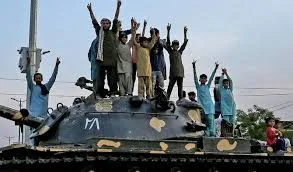Kashmir in Crisis: Suppression, Silence, and the Shadow of War
In the aftermath of a military setback against Pakistan, Indian forces have intensified their grip on Indian-administered Kashmir, launching what many observers call an undeclared siege. Thousands of Kashmiri youth have been rounded up. Homes have been torched, entire neighborhoods demolished, and disturbing reports suggest that girls and women have been taken to military camps. The valley, once described as the Switzerland of Asia, now resembles a war zone under lockdown.
No journalist is allowed to enter. The internet is a luxury permitted only to a few vetted individuals. What little information escapes the region paints a grim picture of systematic repression.
Then, on April 22, a brutal attack on a tourist site near Pahalgam claimed 26 lives. India immediately pointed fingers at Pakistan, alleging the involvement of a little-known militant group called The Resistance Front (TRF). The group, however, denied any role. The incident triggered another round of accusations and retaliation.
Within weeks, India struck targets across the Pakistani border, killing civilians, including women and children. Pakistan responded swiftly, targeting the military installations from which the initial missiles had been launched. Tensions soared as India deployed dozens of fighter jets, including the much-vaunted French-made Rafales. But in a dramatic counter, Pakistan reportedly shot down five Indian aircraft—three of them Rafales. A ceasefire was hastily negotiated by then-U.S. President Donald Trump at India’s request.
At the core of this bitter and recurring hostility lies Kashmir—a territory whose fate has remained unresolved since 1947.
Back then, the princely state of Jammu and Kashmir was given a choice: accede to India or Pakistan. Despite the region’s Muslim-majority population, its Hindu ruler, Maharaja Hari Singh, aligned with India. The decision, never accepted by Kashmiris, they fought back and liberated the Area now called Azad Kashmir.
Today, Kashmir is divided. India administers the Kashmir Valley, Jammu, and Ladakh; Pakistan oversees Azad Jammu and Kashmir and Gilgit-Baltistan. China controls Aksai Chin and the Shaksgam Valley. Each stakeholder maintains its grip, but the people of Kashmir continue to suffer the consequences.
In August 2019, India revoked Article 370 and 35A, stripping Kashmir of its special constitutional status. This opened the door for demographic change: over 85,000 domicile certificates have reportedly been granted to non-Kashmiris—mainly retired Indian army personnel and Hindu settlers—stoking fears of engineered demographic shifts.
Elections in 2024 brought Omar Abdullah back into the political spotlight, but his government holds little actual power. Real authority remains with the Indian Army, and the façade of democracy has offered little relief to the people.
Human rights groups have consistently flagged violations in the region. Thousands of young Kashmiris are behind bars. Freedom of speech, religion, and assembly has been suppressed. Dissent is met with detentions; protest is criminalized. Even digital resistance is quashed—over 8,000 social media accounts were blocked in the wake of the Pahalgam attack, many belonging to journalists, activists, and ordinary citizens.
India continues to label Kashmiri resistance as terrorism, but on the ground, the narrative is far more complex. What is framed as national security is, to many Kashmiris, the erasure of their identity and voice.
The media, once a potential ally for truth, is now a tool of statecraft. News portals have been shut down or repurposed to echo the state’s perspective. Journalists who dare to report independently face harassment or arrest.
What happens in Kashmir is not just a regional dispute—it is a human tragedy unfolding in silence.
Until the world chooses to listen—and act—Kashmir will remain caged in conflict, its people paying the price for geopolitical games played far from their homes.
